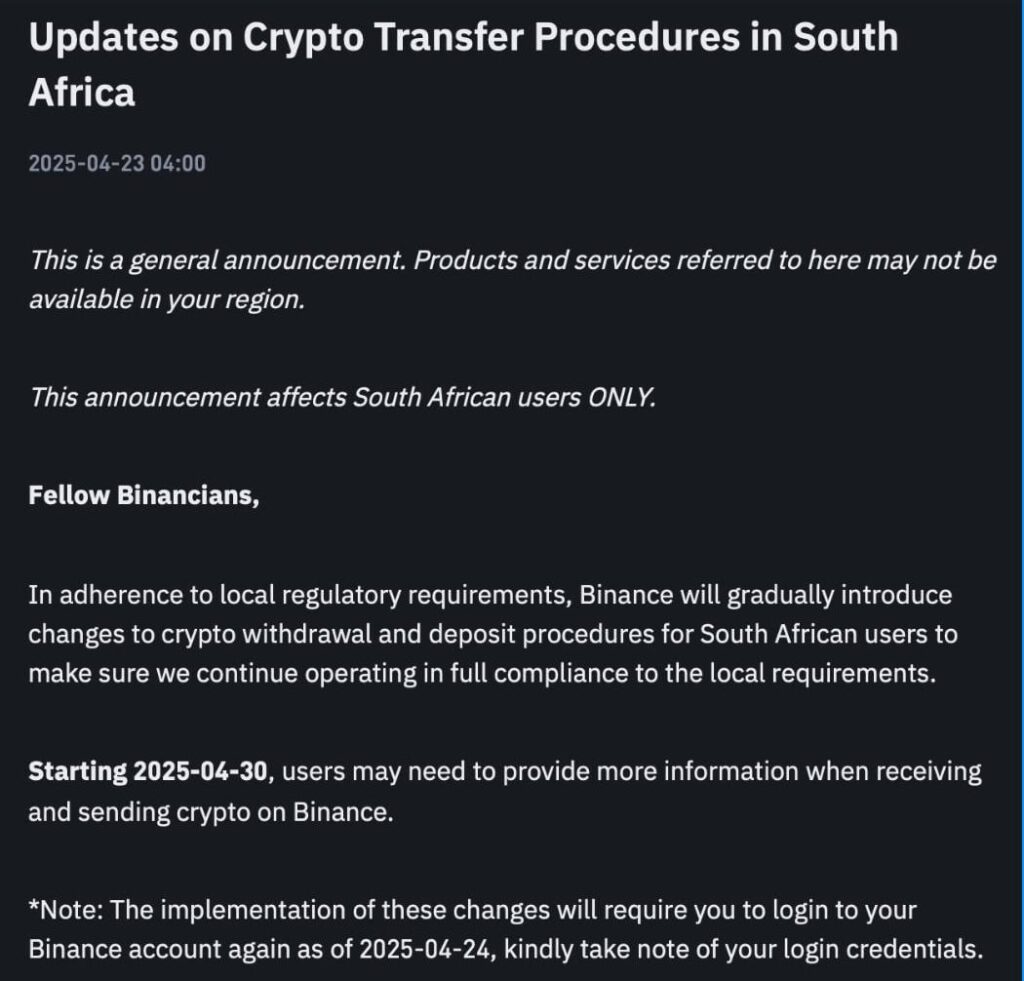-
This Binance crypto compliance update forces South African traders to supply detailed sender and recipient information or face delayed or reversed transfers.
-
Aligning with FATF Travel Rule standards boosts consumer protection but challenges the anonymity traditionally prized in crypto.
-
Traders can maintain operational continuity by updating profiles, pre-validating recipient data, and using FSCA-approved platforms to meet new requirements
South Africa once envisioned a change, implemented a change and now calls others to comply with the change with the most prominent players in the Global crypto market adhering.
Today, South African traders cannot ignore the new Binance crypto compliance rules, as the SARS crypto regulation deadline is fast approaching.
According to the largest crypto Giant in the world, as of April 30th, South African Binance must furnish sender and recipient details or face delayed or reversed transfers.
With Binance joining the FSCA-approved crypto platforms in South Africa, this question is whether this is truly an attempt to enhance consumer protection or start a controlled “decentralized” ecosystem.
Navigating Binance Crypto Compliance: What Every African Trader Needs to Know
Binance Tightens Compliance Amid South Africa’s Regulatory Push
Binance has recently announced new compliance measures requiring South Africans to provide sender and recover information for all crypto transactions.
Albeit this move ensures the Giant plays ball with the FATF’s Recommendation 16—commonly known as the Travel Rule, many questions still linger.
For instance, the Binance crypto compliance policies now demand the beneficiary’s name, country of residence, and exchange name. At the same time, incoming deposits will remain pending until originator data is supplied.
For hardheaded customers, non-compliance may trigger delays, transaction reversal, or even account holds/freezes.
These policies align with the FAFT travel rule compliance strategies, but sharing such information does whitewash the notion of anonymity that digital assets provide. It does comply with South African law, but at what cost?
FATF Travel Rule Compliance and Binance’s Response
The FATF Travel Rule compliance policies mandate that virtual asset service providers (VASPs) collect, verify, and transmit customer and counter-party data before processing transfers.
As a response, Binance crypto compliance strategies have shifted in respect, showcasing a global shift toward stricter regulatory oversight of digital assets.
CHECK OUT: Kenya Crypto Laws: Hyperfocused Pathway Through Regulatory Overwhelm
South Africa is among Africa’s Big Three crypto hubs, fighting for the number one position with Nigeria and Kenya. As a result, the nation has had numerous cases of fraudulent activities over the past few decades, with it dominating back in 2023 and 2022.
With new Binance withdrawal requirements now in place South African users will be forced to provide intricate details or face pending transactions leading to reversal if no information is provided

Binance announced the changes in an attempt to comply with Africa’s regulatory shift.[Photo: 99Bitcoin]
Why These Changes Matter for African Traders
Risk Management & Operational Continuity
The new Binance crypto compliance strategy presents both challenges and opportunities. The recipient details’ pre-validating process prevents common scams from running rampant within the country.
In addition, it prevents scenarios like money laundering and association with non-compliant platforms known just to vanish overnight.
Regulatory Alignment & Reputation
The new South African crypto regulation is more of a badge of approval for most businesses and platforms. It aligns you with banks and remittance partners increasingly wary of non-compliant VASPs.
South Africa’s FATF greylist status has driven stricter oversight of the crypto industry, with the Financial Sector Conduct Authority (FSCA) and South African Revenue Service (SARS) playing key roles in enforcing compliance.
The SARS crypto registration deadline is now a gatekeeper for broader market access rather than a limitation.
Market Differentiation
The South African crypto market is projected to generate US $373.5 million in revenue in 2025. With regulatory momentum increasing, the FSCA has approved 59 crypto platform licenses, while over 260 applications remain under review.
Becoming one of the FSCA-approved crypto platforms in South Africa is now a golden ticket to participate in the million-dollar market.
Understanding FATF Travel Rule Compliance on Binance
What Is the Travel Rule?
The FATF Travel Rule compliance standard requires VASPs to collect and verify:
- Sender/recipient names
- Physical addresses or national IDs
- Wallet addresses and transaction amounts
Unlike Kenya or Nigeria, South Africa’s approach eerily mirrors European models, emphasizing accountability without stifling innovation. Its approach inspired Kenya’s recent VASP law, kickstarting a wave of similar frameworks across the continent.
Building Trust in African Crypto Markets
How to Comply with Binance South Africa Crypto Policies
To navigate Binance’s new compliance measures, traders should take several practical steps:
- Update Profile: Ensure your Binance account reflects accurate personal and tax details.
- Verify Recipients: Pre-validate beneficiary information for withdrawals.
- Register with SARS: Meet the SARS crypto registration deadline to avoid penalties.
Using FSCA-Approved Platforms
For better risk management coupled with lower transaction fees, FSCA-approved crypto platforms in South Africa, like Luno or Valr, are a rising option for most.
The license acts as a badge from regulatory organizations showcasing better security and risk-prevention features from traders.
Currently, 75 crypto asset service providers (CASPs) are authorized under the Financial Advisory and Intermediary Services (FAIS) Act in South Africa.
Africa’s Crossroads: Regulation vs. Innovation
The Binance crypto compliance policies speak volumes to a grand shift within Africa. After decades of suffering from crypto scams and having infights between innovation and regulation, Africa might be coming to equilibrium. Transparency is among the key notions of Web3, and regulations are being introduced. Many question if this is the right move.
The fact is that developing a legal framework that balances regulation and innovation is not easy. It does feel restrictive, but given the high rate of scams, it’s bound to provide more good than harm.
